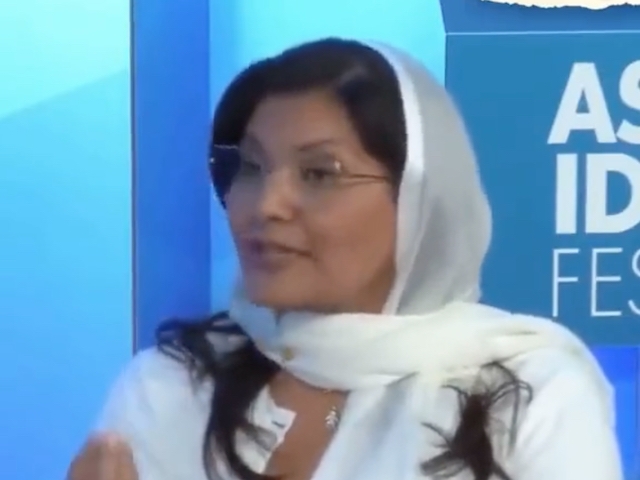Against the background of rumors of a peace agreement being worked on between Israel and Saudi Arabia, a rare public statement comes from the Saudi royal family, and from an unexpected direction Colorado. It happened in Aspen, where Princess Reema Bint Bandar Al Saud, the Saudi ambassador to the United States, was interviewed at an event by a local research institute.
"We want to see Israel prosper," said the princess, "Vision 2030 talks about a unified, integrated, prosperous Middle East, and the last time I checked, Israel was there. We want a prosperous Red Sea economy." Her words were said against the background of Foreign Minister Eli Cohen's words in a Yedioth Ahronoth interview, according to which there is a window of opportunity for an agreement with Saudi Arabia. "It will happen," he claimed.
Saudi Arabia’s 🇸🇦 ambassador to the US 🇺🇸 HRH Princess Reema bint Bandar Al Saud @rbalsaud may be the most eloquent, knowledgeable and visionary Middle Eastern diplomat. pic.twitter.com/h2Yj7Aura8
— Avi Kaner ابراهيم אבי (@AviKaner) June 28, 2023
The Saudi ambassador said that the kingdom's goal is "integration" and not "normalization" with Israel: "Normalization is that you sit there, and I sit here, and we exist together, but separately. Integration means that our people cooperate, our businesses cooperate and our youth prosper. We are talking about an integrated Middle East, united like the European bloc, where we all have sovereign rights and sovereign states, but we have a common interest."
The princess, who four years ago became the first female ambassador in the history of Saudi Arabia, is what the kingdom wants to present to the West. She grew up in the United States, advocates the empowerment of women, and has worked extensively to provide opportunities for women in Saudi Arabia. More than a decade ago she divorced her husband after they had two children, a rare event in the traditional Islamic world. Despite these things, she also added that the policy of the Netanyahu government towards the Palestinians complicates the efforts to reach regional peace. "The current attitude of the Israeli government in the West Bank is so terrible," she said, specifically mentioning the settlements as "problematic" and "something we are trying to solve."
ما أعظم
— Badr Al_Saadoun (@bas_ksa_) June 27, 2023
هذة العملاقة #المملكة_العربية_السعودية 🇸🇦
تُبكي الناس بلا ندوب 😉
ِ
نستمع
لـ بكائيات كثيرة
على مدى السبعون عام الماضية
وأحدثها هذة البكائيات التي انطلقت بعد صناعة الهدوء مع #إيران بضمانه #الصين !!#البكائيات
ِ
P.s
تبقي
القليل من الوقت
لـ إحكام أغلاق الباب ..#الرياض… pic.twitter.com/X8Yff9RZNV
The White House, which has recently been pushing for a breakthrough in relations between Israel and Saudi Arabia, last night commented on the princess's words. State Department spokesman Matthew Miller said in his daily briefing: "We have conveyed our concerns about the settlements and increasing housing units there directly to the Israeli government, and I believe they can understand the broader implications."
Saudi Ambassador to the U.S. Princess Reema bint Bandar Al Saud said on Saturday afternoon that Israeli-Palestinian peace was in line with Vision 2030, the kingdom’s massive social reform project.
— Adam Milstein (@AdamMilstein) June 27, 2023
“We want to see a thriving Israel”https://t.co/A1VmQ41BRy
Still, at the conference she attended in Aspen, the Princess expressed her personal commitment to reaching an agreement with Israel: "Nothing would give me more pleasure than being the first Saudi diplomat in the United States and seeing a solution to the Palestinian-Israeli crisis, because it is a crisis that robbed me of my father." The ambassador's father, Prince Bandar Bin Sultan Al Saud, served as the Saudi ambassador in Washington for more than two decades and is considered the architect of relations between Israel and Saudi Arabia. "I mourn these 23 years in which he was ambassador," she explained. "These were 23 years in which he lived on a plane. He dedicated his life to solving this situation."


